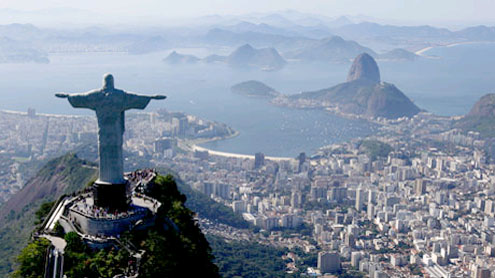 On the screen an awestruck Nicole Kidman stares down at Rio’s spectacular, undulating mountains from the comfort of an executive jet.
On the screen an awestruck Nicole Kidman stares down at Rio’s spectacular, undulating mountains from the comfort of an executive jet.
She steps onto the tarmac and is ushered into a stretch limousine. It carries her through the sun-kissed streets of this seaside city, past the Sugar Loaf mountain and along Ipanema beach to the seductive beat of a bossa nova.Finally, Kidman emerges from the car and sweeps down a green carpet in a skin-tight red ballgown, surrounded by paparazzi. Her destination? Rio’s Village Mall, a R$350m (£125m) luxury shopping centre being erected in Barra da Tijuca, a rapidly growing neighbourhood in the city’s west zone.
“The Village Mall is the shopping centre Rio de Janeiro was waiting for,” gushes the voiceover on the glamorous television commercial, for which Kidman was reportedly paid some R$400,000.Set to open later this year, the mall is only the latest symbol of Brazil’s commodity-fuelled boom which on Tuesday helped the country overtake the UK as the world’s 6th largest economy.
Multiplan, the company behind the shopping centre – which will boast four VIP lounges and six state of the art cinemas – claims it will exemplify “Rio Chic”. On Tuesday, as sweat-drenched workers in blue uniforms clambered over the complex’s colossal concrete shell and giant cranes hauled steel columns into place it became yet another indication of Brazil’s arrival onto the world stage.
While growth slowed in 2011, down from 7.5% in 2010 to 2.7%, that was still enough to help this booming South American nation leap-frog the UK, another step on the path towards global economic and political greatness.Speaking in Hanover, Brazil’s president Dilma Rousseff captured the public mood declaring her country “the land of opportunities”.
It was just one of many superlatives currently being heaped on Brazil and in particular Rio de Janeiro, a city politicians say is being “reborn”. Increasingly it feels like one giant construction site with luxury condominiums, shopping centres and office blocks springing up across town and cranes dotting the horizon.Hardly a day goes by without reports in the local press of Brazilians flocking home in search of a piece of the boom, or crisis-hit Europeans turning up in droves seeking job opportunities.
One recent article in the news magazine Veja claimed that of the 200,000 professionals who had abandoned Rio’s stagnant economy between 1980 and 2000, 70% had returned home since 2009. The magazine attributed the reversal to three factors: a fledgling oil boom off the Rio coastline, the upcoming 2014 World Cup and 2016 Olympics and improved security. In total, Veja said some R$181.4bn would be invested in the local economy between now and 2015. The magazine claimed that represented an average investment of R$4.17m per square metre — “the highest concentration of resources in the world.”
Among those to have returned is Marcelo Haddad, the executive director of Rio Negocios, the city’s newly created investment agency. Like many local businessmen and financial workers Haddad spent much of the last two decades in Sao Paulo but came back three years ago lured by an explosion of investment in Brazil’s former capital.”Since I have come back I have seen so much energy, so much motivation to make things happen… and I think that in the future Rio will be even more attractive than it is now,” said Haddad, 50, a Harvard graduate and former HSBC employee who came back to Rio to head a project revitalizing the city’s port.
“We have always been dreamers, we have always had a vision but now we are achieving that vision,” he said. “I feel very proud to come back to Rio to work. It’s a very special moment. We are getting a lot of talent back.”Claudio Bruni, the CEO of BR Properties, Brazil’s biggest commercial real-estate company, is also smiling. His company is pushing ahead with ambitious plans to build and remodel offices in Rio for foreign and Brazilian companies, many of them linked to the oil boom. Bruni’s latest project saw an abandoned 12-storey Oscar Niemeyer building restored, modernized and rented to BP and the Norwegian oil company Statoil.
Bruni said Rio’s market for office space was booming as the city was becoming “one of the greatest oil centres in the world.” “Today our best quality properties and those with the highest prices are in Rio … because of the great demand. We are excited and looking to make more investments.”Foreign businessmen and politicians are also lining up for a slice.
“This is a visit I’ve been looking forward to for a very long time,” the foreign secretary William Hague told the Guardian during a visit to Rio earlier this year, intended, he said, to show the UK’s “desire to intensify relations with Brazil”.Challenges remain despite the superlatives. While security has improved, much of Rio remains off-limits to outsiders with heavily armed gangs still controlling many of the city’s slums. Murder rates have dropped but remain startling high in many corners of the city.
Poverty persists. A study released last month by Brazil’s Institute for Applied Economic Research, Ipea, found that while the number of people living in absolute poverty has declined from about 4% of the population in 2001, to round 2.2% now, some 351,000 people in Rio state were still surviving on less than $2 a day in a state of 15.9m people.
But the overall mood is one of optimism. “It’s a very interesting time,” said Haddad, the head of Rio’s investment agency. “Rio is facing one of the brightest and most attractive moments [in its history].”Asked if he regretted returning to the city where he was born, Haddad, a native of Copacabana, laughed. “Absolutely not.” – Theguardian












